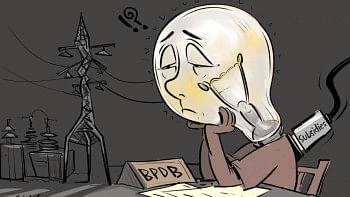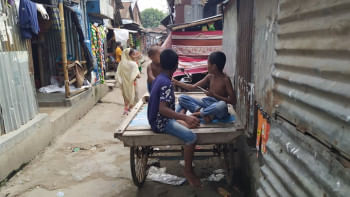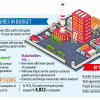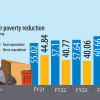Next budget should prioritise poverty elimination

A report recently released by the Bangladesh Institute of Development Studies (BIDS) affirmed that there had been a sharp increase in poverty rates across multiple districts between 2022 and 2024, "with food insecurity reaching alarming levels." The World Bank finds similar poverty rate trends, which may continue this year with the expected slowdown in the FY25 GDP growth rate. The recent political changes, economic disruption, and high inflation have hit the poorer people hard.
Advocates for the poor can only hope that the upcoming national budget, now being prepared by the interim government (IG), will address the economic well-being of the poor and offer additional support for the social safety net programmes. After the last budget in June 2024, a widely circulated news item quoted a resident of Dhaka expressing his dismay after the then finance minister announced the policy measures in the now-dissolved parliament. "This is a strange country. It keeps siding with the rich and dishonest people, leaving its poor alone in extraordinary crisis," said Nahid Miah, head of a lower-middle-income household and a father of three.
The various commissions and task forces formed by the IG have identified areas of concern that need reforms and suggested policy measures that demand immediate attention. Some of the high-priority budget line items relate to the creaky social safety net, employment creation in rural areas, health services for low-income households, and economic inclusion of vulnerable groups.
There are various indications that some segments of lower-income households have, in recent months, experienced destitution, indigence, and food insecurity. Multiple factors have contributed to such hardships.
The head of the IG, Prof Yunus, has been a lifelong champion of the poor, and is well aware of the "harir khobor" or family balance sheet of the masses in rural and urban areas. Unfortunately, one of his visions, the total eradication of poverty by 2030, is still not within our reach. Nonetheless, his tenure as the head of the government can be expected to re-energise the "poverty elimination" movement in the country and around the globe.
To reduce poverty in Bangladesh, the IG should focus on sustainable economic growth, skills development for the youth, and strengthening social safety nets. The 2025-26 budget has to make provisions to remind ministries to prioritise "corruption free" investment in infrastructure, improving the business environment for SMEs, and promoting inclusive growth through education and health programmes.
Government spending on social safety net programmes, infrastructure, and human capital development can directly and indirectly improve the living standards and economic opportunities of individuals and families struggling with poverty.
Bangladesh has fallen behind in implementing programmes undertaken for the Sustainable Development Goals (SDG) initiative. There are many goals, including the first one, which calls for the elimination of extreme poverty in the country, that need to be put on the fast track by this and future governments, and the completion of these goals needs to be expedited. The IG has a rare opportunity to reinvigorate the SDG Action Plan with necessary modifications. The previous executive director of Yunus Centre has been appointed as the principal coordinator of SDG affairs in the Chief Adviser's Office to coordinate the implementation of the SDGs. Since inclusive and equitable distribution of opportunities must be a guiding principle for our leaders, the SDG team must be fully integrated into the budgetary process.
The US government, which provided financial and material support for many of our anti-poverty programmes, has scaled back its contribution. Hence, other sources, including the government and other G7 countries, need to step up to fill the gap. USAID had in the past played a significant role in food security programmes, disaster relief, and in combating maternal and child mortality. The NGOs and government agencies need to review how the reduction in external resources might impact the poor and other vulnerable groups.
There is a knowledge gap in the government's data collection efforts. Delays in the release of time-sensitive data are affecting our poverty-oriented policymaking. Takahiro Utsumi, head of research at the World Food Programme (WFP) Bangladesh, said they have partnered with European statistics experts and the BIDS to refine small-area poverty estimation. "Our estimates, based on the 2022 Household Income and Expenditure Survey, need updates due to economic downturns and shocks affecting households," he said. He added that, "Understanding recent poverty trends is crucial for effective policymaking."
In the same vein, one needs to add robust management information systems to streamline National Social Security Strategy expenses and strengthen the National Household Database.
An earlier study found that Bangladesh's social security programmes have high exclusion errors (i.e. leaving out deserving beneficiaries), inclusion errors (including non-deserving beneficiaries), and leakages from the system. Many poor people living in remote areas are "unaware of social protection schemes or cannot access them due to lack of motivation of officials to go to remote sites and create awareness."
Strengthening the social support network in Bangladesh is crucial and should be a priority in the budget. Bangladesh's social protection system, which includes programmes like cash transfers, food support, and maternity allowances, should be expanded and improved to better address the needs of the poor and vulnerable.
The new budget must review items on the following checklist for its social programmes: job creation, skills development, enhanced transparency and accountability, reduced corruption, reduced risks from natural disasters and climate change, disaster resilience, and improved agricultural productivity.
A 19-country econometric study found that there is "no clear evidence that higher government spending has played a significant role in reducing income poverty in low- and middle-income countries," according to a paper published in World Development. What this means is that we must strive to do better.
The recent op-ed titled, "The Evolution of Poverty Research in Bangladesh," on these pages offered an interesting review of the evolution of academic research on poverty. I enjoyed reading the historical narrative of the involvement of some institutions, particularly BIDS, in solicitations of funding and government attention in this critical area. I'd like to mention the pioneering work done by Shopon Adnan of Dhaka University in the early 1970s by his village studies group when we were his students in the economics department. We followed up on that work at the International Food Policy Research Institute (IFPRI) during 1980-83. Our study, jointly conducted by IFPRI and BIDS and funded by the WFP, provided insights into the role of rural infrastructure by using the randomised control trials methodology. Of the total of 16 randomly selected villages, half were from areas with limited infrastructure (roads, electricity, and telecommunication services). Our team leaders were Raisuddin Ahmed of IFPRI and Abdul Gafur, Mahabub Hossain, and Abu Abdullah of BIDS.
The contribution of Prof Anisur Rahman, who was a strong advocate for people's self-development and Participatory Action Research, must also be recognised. He was instrumental in introducing and promoting PAR in Bangladesh through Research Initiatives, Bangladesh (RIB).
Dr Abdullah Shibli is an economist and currently employed at a nonprofit financial intermediary in the USA. He previously worked for the World Bank and Harvard University.
Views expressed in this article are the author's own.
Follow The Daily Star Opinion on Facebook for the latest opinions, commentaries and analyses by experts and professionals. To contribute your article or letter to The Daily Star Opinion, see our guidelines for submission.

 For all latest news, follow The Daily Star's Google News channel.
For all latest news, follow The Daily Star's Google News channel. 











Comments